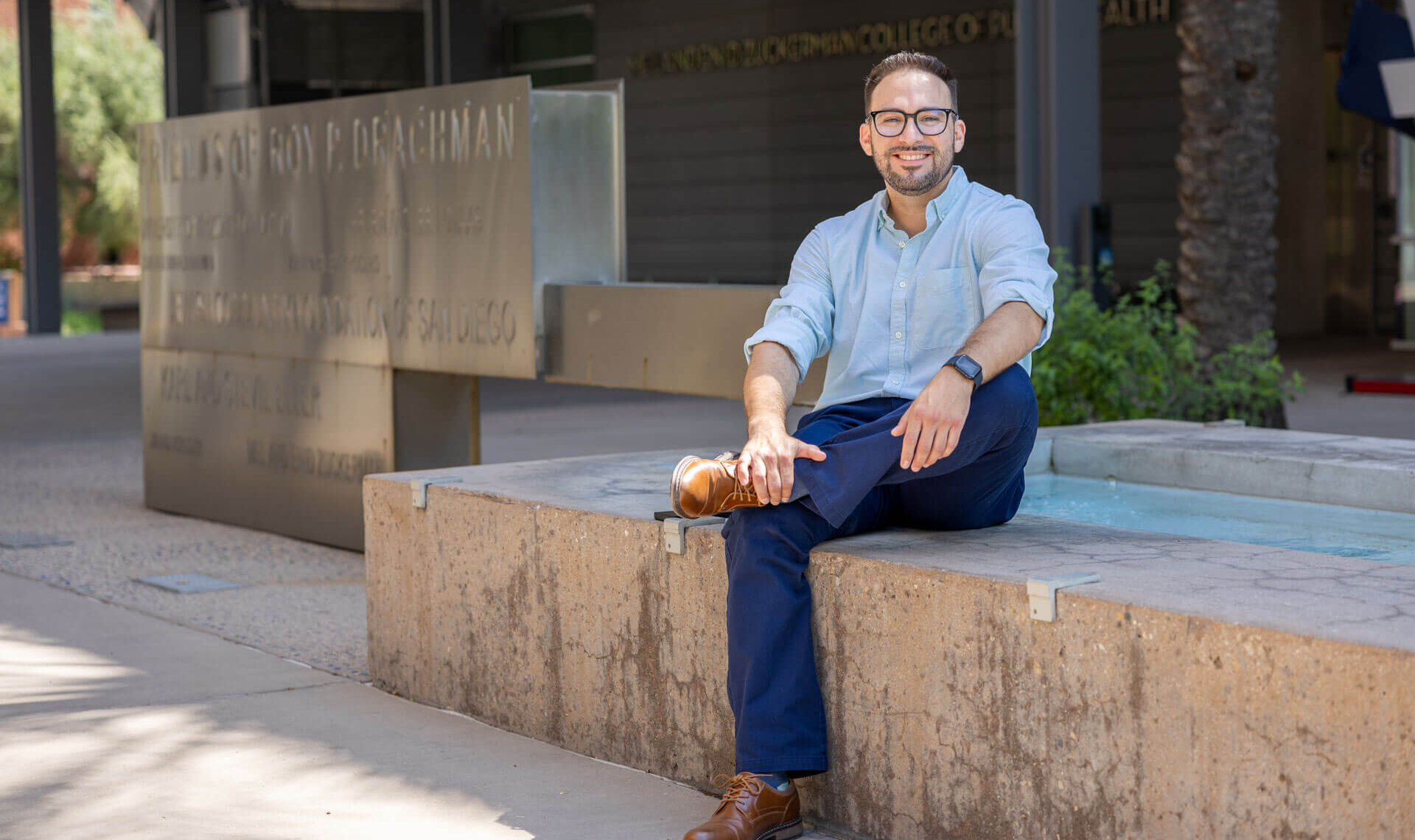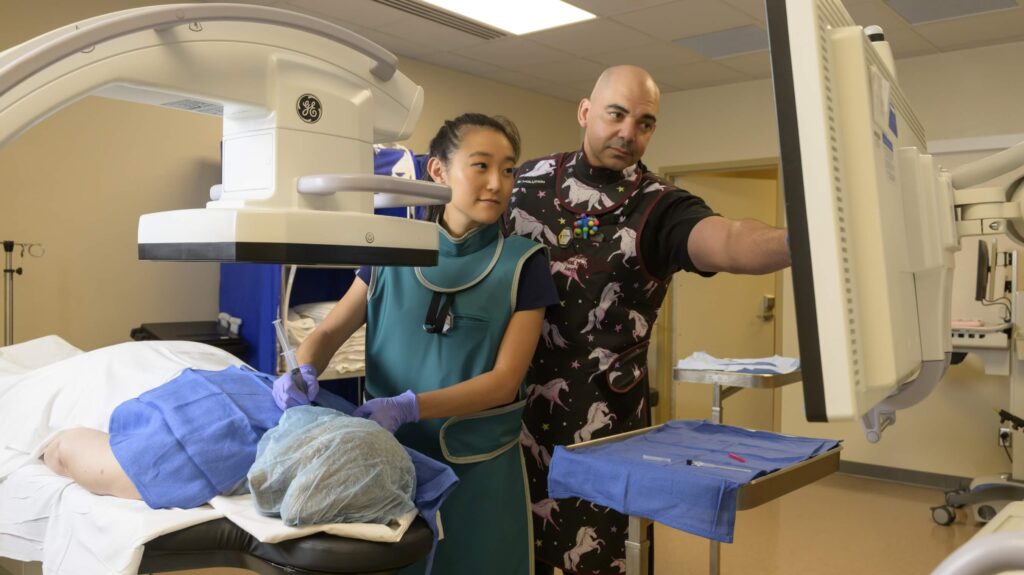Rogelio Robles-Morales, MD, began his medical career as an obstetrician-gynecologist in Nogales, Mexico; however, during his residency, he had the opportunity to gain experience in subspecialties or fellowships related to obstetrics and gynecology. An introduction to gynecological oncology inspired him to pursue a career in cancer care and research.
“I assisted an oncologist in a surgery that was so delicate and intricate – it amazed me,” Robles-Morales said.
During his residency training, Robles-Morales was diagnosed with Type 1 diabetes. He said he was afraid his longevity as a surgeon would be decreased due to the long duration of oncology surgeries, and he wanted to remain active helping cancer patients for a longer time.
So he entered the doctoral program in clinical translational sciences at the University of Arizona College of Health Sciences. His focus was on cancer prevention methods that could benefit his hometown of Nogales and other underserved communities.
He was drawn to the university by Cynthia A. Thomson, PhD, a professor emeritus at the U of A Mel and Enid Zuckerman College of Public Health and U of A Cancer Center member who retired last fall. She stood out to him as a leader in women’s health initiatives in Southern Arizona and became his faculty mentor.
“I felt that in order to be more impactful during my practice, I needed to do something that will not only help the patient in front of me, but can transcend to the community,” Robles-Morales said. “I have gained a lot of public health experience and knowledge from Dr. Thompson, which helped me get more in touch with my community. I have come to understand that a great goal for any research project is policy change or to create a program. That way your work keeps on going without you and may lead to even more discoveries.”
Amplifying his impact on patients
As part of his doctoral studies, Robles-Morales participated in the Vida Plena study, which was led by Thomson to improve the uptake of American Cancer Society guidelines for cancer survivorship. She encouraged him to use his experiences as a doctor to aid his translational research.
“I bring the clinical perspective of what the difficulties are during cancer treatment, whether patients are going to be eligible for the clinical trial, and expertise in other terminologies and concepts,” Robles-Morales said. “I’ve also recruited some of my own patients to join the study. It’s hard to get people to think about things like physical activity and nutrition after heavy chemotherapy and surgery. With this, I’m taking responsibility to say, ‘I am the surgeon, and I am also taking care of the pre-op and the post-op and the healing after they go through chemo.’”
Thomson connected him with an additional mentor with similar expertise, Purnima Madhivanan, PhD, MBBS, MPH, an associate professor of health promotion sciences in the Zuckerman College of Public Health and a member of the U of A Cancer Center. She shares Robles-Morales’ vision of bringing global health strategies to local communities.
Madhivanan and Robles-Morales applied the experience they gained in other countries to spark an idea to increase cervical cancer screenings and vaccination rates. The project involves using community health workers as liaisons between community members and health care professionals. Patients are empowered to self-collect a sample when they want to avoid the more invasive pelvic exam.
“In a lot of cultures, women do not feel comfortable about having a pelvic exam,” Madhivanan said. “This is something that I’ve already done in India, and we’re trying to replicate it here in the United States. We use community health workers to get patients comfortable about self-sampling.”
Morales echoed this passion for improving screenings for cervical cancer.
“Women’s cancer screenings are often more invasive and uncomfortable than those for men,” he said. “I’m advocating for a less invasive procedure for women to screen for cancer, because if there is a need for a deeper evaluation after an initial screening, everyone will go through it. But going for something that invasive, just to get screened? It seems wrong. How is it possible that we’re screening woman with the same procedures that were invented almost 100 years ago?”
Going the extra mile to achieve results
Madhivanan said the scale of this project was so large they had to come up with a plan to help uninsured women who needed follow-up procedures after initial screening. They decided to provide free treatment to these patients at Robles-Morales’ clinic in Mexico. He he has led multiple fundraising events to cover the expenses.
Madhivanan calls Robles-Morales a “shining star” in cancer research and prevention, adding that his background of practicing medicine in Mexico leads to unique approaches to problem solving.
“We are using out-of-the-box strategies to make this happen,” said Madhivanan, who is a member of the university’s BIO5 Institute. “Dr. Robles-Morales is a doctoral student and my practice is in India, but we are very similar culturally and in the way we think. We wanted to see if there was some way we could shake the status quo and have a paradigm shift in terms of applying some of the strategies we have used in global health settings right here in our backyard in the United States and Mexico.”
She said Robles-Morales’ unique combination of drive and humility is key to his success as a researcher and clinician.
“He’s one of those rare individuals who has the empathy, intelligence and dedication to truly make a difference,” Madhivanan said. “He’s not pursuing his PhD for credentials – he’s already an MD. He’s doing it because he wants to help people.”
As an obstetrician-gynecologist, Robles-Morales said much of his work focused on the joy of welcoming a new life. Now, he has embraced the challenge and triumph of fighting cancer and saving lives while making meaningful connections with his patients.
“We have this special connection,” Robles-Morales said of his patients. “I always use the word team – ‘Your family and me are a team fighting against this.’ I always try to portray myself as their ally.”




